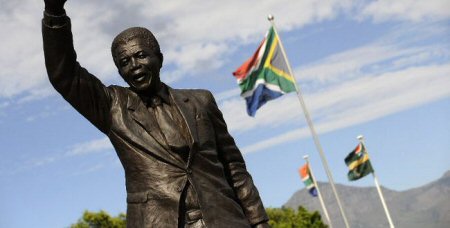On Tuesday, South African Minister for Science and Technology, Naledi Pandor, called on the ruling ANC party to severe diplomatic ties, during a parliamentary session which followed the President’s state of union address, last Friday.
Pandor stated that South Africa should cut ties, ‘given the absence of genuine initiatives by Israel to secure lasting peace and a viable two-state solution that includes full freedom and democracy for the Palestinian people.’
During the national conference of the ruling ANC party, in December, similar calls were made for disengagement and the downgrading of diplomatic relations but, as of yet, have not been realized.
‘In order to give our practical expression to the oppressed people of Palestine, the ANC has unanimously resolved to direct the South African government to… immediately downgrade the South African Embassy in Israel… to a liaison office,’ the resolution read.
‘We concur with the PLO leader, Jibril Rajoub, who was at our conference, and explained that the downgrade of the SA Embassy in Israel will send a clear message to Israel that there is a price to pay for its human rights abuses and violations of international law,’ the resolution continued, according to the PNN.
Pandor’s remarks signal a revitalization of South Africa’s diplomatic calls and would be one of the first major foreign policy changes since the ousting of South Africa’s former president, Jacob Zuma.
The ANC called on Zuma to step down, earlier this month, after being embroiled in a lengthy corruption case. Among other charges, Zuma stands accused of back-door dealings with the Gupta family, a leading business family who had emigrated to South Africa from India.
Pressure on Zuma to resign mounted after local police closed in on the Gupta family, conducting raids earlier this month, and having been put in the international spotlight after a New York Times investigation revealed attempts by the Gupta family to inflame racial tensions in South Africa for political and financial gain, via a now-defunct British PR firm.
Zuma had previously survived numerous votes of no confidence within the parliament.
His replacement, President Cyril Ramaphosa, has championed an anti-corruption, pro-democracy and reform platform, mirrored Pandor’s remarks.
‘We reiterate our call to the Israeli government to engage in meaningful dialogue with the Palestinian leaders to find a resolution that affirms the equal rights of both people to self-determination, freedom and security,’ Ramaphosa said.
Ramaphosa would further highlight the unlawful detention of Palestinian prisoners, namely children. His speech received praise from the BDS South Africa group who committed to rallying behind the new president.
A parliamentary resolution will still need to be debated and decided upon by the ANC before any meaningful processes are put into place.
The ANC party was founded by revolutionary political leader Nelson Mandela, after the end of his 27-year prison sentence, and has ruled since the end of apartheid.
Pandor called on unity within Africa during her speech, singling out the Western Sahara as a point of contention being, as she described, the last occupied territory on the continent, having declared its independence over 30 years ago.
The Western Sahara remains in the midst of a brutal war between the occupying Moroccan forces and pro-independence separatists and radical jihadist elements.
The Israeli government had previously enjoyed close ties with South Africa, during the rule of the Apartheid regime.
Israel stood accused of supplying weapons to a number of rogue regimes, at the time, who had been black-listed due to human rights abuses – a practice that is continued to this day, as Israel has been accused of supplying arms to the Myanmar army, amidst the highly controversial operations in the Muslim-majority Rakhine state, which have caused a max exodus and ensuing humanitarian crisis.
Attacks against the Muslim Rohingya in Rakhine have been likened to the Rwandan genocide, who also previously received arms from Israel.
02/06/18 Israel Pays a Bounty of $5,000 and Arms for Each African Asylum Seeker Expelled

